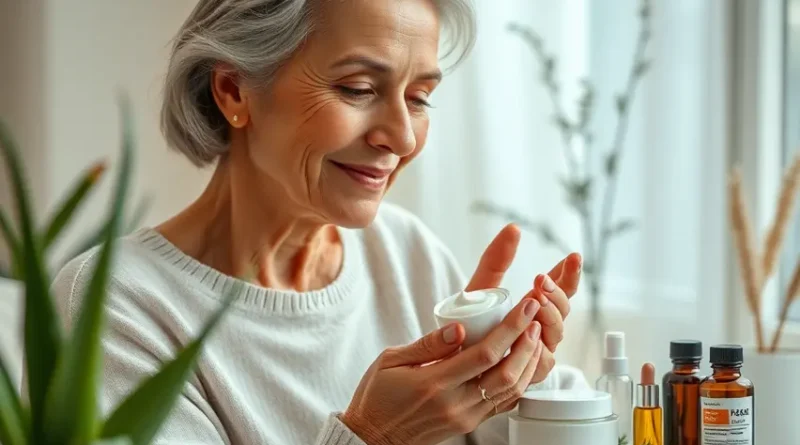How to Naturally Improve Skin Health After Menopause
Menopause is a significant milestone in a woman’s life. It brings about various physiological changes, including shifts in hormone levels that can profoundly affect skin health. Many women notice that their skin becomes drier, loses elasticity, and shows signs of aging more prominently after menopause. However, there are numerous natural strategies that can help improve skin health during this transitional period. In this blog post, we will explore effective ways to rejuvenate your skin naturally after menopause.
First and foremost, understanding the role that hormones play in skin health can help women make informed choices regarding their skincare. After menopause, estrogen levels decline, which can lead to reduced collagen production and skin hydration. A multi-faceted approach that includes diet, hydration, skincare products, and lifestyle changes can vastly improve skin health.
1. Hydration is Key
One of the simplest yet most effective ways to boost skin health is through proper hydration. As we age, our skin tends to lose moisture more quickly, which can lead to dryness and wrinkles. Aim for at least 8-10 glasses of water daily. Incorporating hydrating foods into your diet, such as cucumbers, watermelon, and oranges, can further assist in keeping your skin nourished.
2. Embrace a Skin-Friendly Diet
Your diet has a direct impact on your skin’s appearance. Consuming a well-balanced diet rich in vitamins, minerals, and antioxidants can support skin health. Include foods high in omega-3 fatty acids like salmon and walnuts, which help maintain skin elasticity. Vitamin C-rich foods, such as bell peppers and strawberries, can help in collagen production. Foods rich in phytoestrogens, like flaxseeds and legumes, can also assist in balancing hormone levels naturally.
3. Quality Skin Care Products
Choosing the right skincare products is crucial. Opt for moisturizers that contain ingredients like hyaluronic acid, glycerin, and ceramides, which help retain skin moisture. Look for products that have antioxidants such as vitamin E and green tea extracts. Additionally, include gentle exfoliating products in your routine to remove dead skin cells while promoting cell regeneration. Avoid harsh chemicals and fragrances that can irritate the skin.
4. Sun Protection
The skin’s ability to recover from sun damage diminishes with age. Therefore, protecting your skin from harmful UV rays is paramount. Apply broad-spectrum sunscreen with an SPF of at least 30 every day, even on cloudy days. Wearing protective clothing and seeking shade during peak sun hours can also help prevent further damage.
5. Regular Exercise
Exercise does wonders not only for your physical health but also for your skin. Engaging in regular aerobic activity increases blood circulation, which helps keep the skin vibrant and healthy. Activities like walking, swimming, or yoga promote relaxation and reduce stress, which are essential for maintaining glowing skin.
6. Adequate Sleep
Never underestimate the power of a good night’s sleep. Sleep is when your body repairs itself, including your skin. Aim for 7-9 hours of quality sleep each night. Establish a calming bedtime routine to enhance sleep quality. Consider reducing screen time before bed and opt for soothing activities, such as reading or listening to calming music.
7. Stay Stress-Free
Chronic stress can negatively impact your skin, leading to issues like breakouts and dullness. Incorporate stress management techniques such as meditation, deep-breathing exercises, or mindfulness practices into your daily routine. Even simple activities like gardening or taking a leisurely walk can help reduce stress levels.
8. Natural Remedies
Consider using natural remedies for skincare. Aloe vera, for instance, is known for its soothing properties and can help heal dry and irritated skin. Essential oils like lavender and tea tree oil can provide anti-inflammatory benefits. Skin-safe oils like jojoba and argan oil can also nourish and hydrate the skin, helping mitigate dryness and improve texture.
9. Consult with Professionals
Finally, never hesitate to seek professional advice. Consulting with a dermatologist can provide personalized insights based on your unique skin type and condition. They can suggest treatments and products tailored to your skin needs and offer more advanced options such as chemical peels or laser therapy if suitable.
Remember, skin health is a reflection of our overall well-being. While changes after menopause can be challenging, adopting a holistic approach to skincare can enhance your skin’s vitality and your overall quality of life. Embrace these natural strategies and enjoy the journey toward healthier skin.

